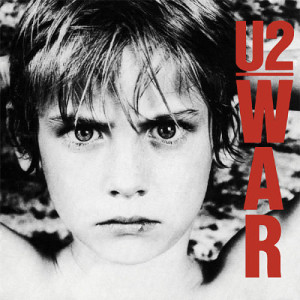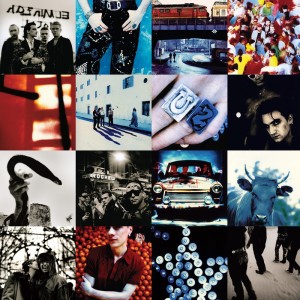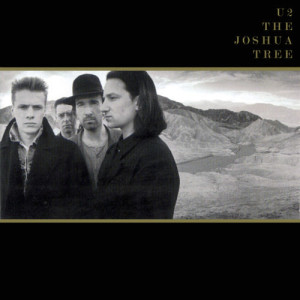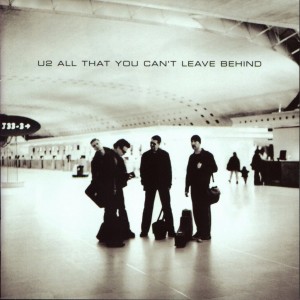New Year’s Day
“Under a blood-red sky
A crowd has gathered in black and white
Arms entwined, the chosen few
The newspaper says, says
Say it’s true, it’s true…
And we can break through
Though torn in two
We can be one.”
By the beginning of the Eighties, the Beatles, the Stones, Zeppelin, and the Who were broken-up, dead, engaged in self-parody, or some not-so-happy mixture of the three. In a way it seemed like the history of rock and roll had already happened, that everyone and everything important had come and gone. There was a hunger for the next big thing, whatever that was. For a lot of people, that next big thing became U2.
“New Year’s Day” is the first U2 song I remember hearing. I loved that song, and the band, from the start. Bono’s soaring vocals, the lyrics that actually had something to say, “And so we’re told this is the golden age/And gold is the reason for the wars we wage”, Edge’s helicopter guitar (alternately jagged and funky, pleading and screaming), the simplicity of the piano, the cauldron of sound and emotion you get when you throw all those things together. And then there was the Christianity. For a kid who wanted to live in a world that made sense—who wanted to believe—maybe this was the cherry on top.
Fast forward thirtysomething years from that sunny summer afternoon: I’m still here and so are U2. Our relationship hasn’t changed much, not really. Back when I got into U2, very few other people cared about the band. They were still semi-underground, at least in the US. They were still cool.
All these years later, Bono and the boys have lived their artistic life cycle, gone from cool to popular to the World’s Greatest Rock and Roll Band to over-the-hill and hated. It’s taken a long time for all that to happen, but at this point it sounds familiar. It sounds like the career arc of every big musical act of my lifetime. Of every one of those classic Founding Fathers of Rock up above.
Once the love happens, the hatred is inevitable. The first question isn’t if, but when that hatred will come. The second question is what will survive in the popular conscious, what critical opinion will endure? Love? Hate? Something in between? There’s a third question, though; one that dwarfs, maybe even voids, the other two. The third question is, “Does it really matter what anyone else thinks?”
One
“Have you come here for forgiveness,
Have you come to raise the dead
Have you come here to play Jesus to the lepers in your head”
I began thinking about writing something on U2 during the iTunes debacle that went with the release of their last album, Songs of Innocence. All over Facebook, Twitter, and the rest of the Internet, the hate was flying. How dare they give us a free album? What could possess them? What fucking audacity…
Nor was this reaction confined to the young, the kids you’d fully expect to hate U2 just on generational grounds. Every closet libertarian and faux free speech advocate was up on his or her high horse blathering about Edward Snowden, Chelsea Manning, the evil Apple Corporation, and, of course, the nefarious ministrations of Bono and his paunchy band of geriatric droogs. 1984 had really, finally, come. And Bono was Big Brother.
In retrospect, the complaints about getting free music and the travails of having to delete it still don’t hold a lot of resonance for me. But I have to say that the cool critical reception the album received has stuck with me. And I’ve come to share it. Songs of Innocence is the first U2 album I haven’t really listened to. You know, repetitively, addictively.
Sure, I sat through it a couple of times, but it didn’t sink its nails into my soul and make me memorize its songs the way so many others have. It was disjointed, a weak effort in spite of the five-star review Rolling Stone gifted it with and its subsequent selection as their album of the year. Songs of Innocence may even be U2’s worst album, something that’s never a welcome sight to a fan, but especially not this late in a career. (Think of what Dirty Work meant for the ‘Stones or Coda for Zeppelin.) It doesn’t take much imagination to interpret Songs of Innocence as the beginning of the end. Which, in a way, brings me back to my third question: Does it matter what anyone else thinks about U2? The short answer is, “No.”
What I’ve gotten from U2, what any audience receives from any artist, is the joy of discovery, the act of finding something they love in the world. These are the sorts of surprises that make life worthwhile, and the older you get, the less of them there are. (I thought of this a few weeks ago when I was reviewing a book, one I shouldn’t have liked, one I was genuinely surprised to enjoy as much as I did.)
Maybe you become jaded as you age, harder to surprise. Or maybe you just realize that you’re never going to get everything right; that the opinions people spit out with such adamancy now could be gone in a year or ten or fifty. That regardless of whether those opinions live or die, one thing will absolutely be gone at the shadowy end of that time frame. And that one thing is you.
But memories of past discoveries and the feelings they evoke—the sadness they helped you cope with, the anger they helped you through, the thrill of driving in the car with the top down and the stereo cranked singing along with something that actually spoke to you, that sunny summer afternoon when you first heard “New Year’s Day”—those memories are some of the best in life. And not many things in this world have the power to change memories. Memories belong to you in spite of what anyone else has to say, in spite of love and hate.
I Still Haven’t Found What I’m Looking For
“I believe in the Kingdom Come
Then all the colours will bleed into one
Bleed into one.
But yes, I’m still running.
You broke the bonds
And you loosed the chains
Carried the cross of my shame
Oh my shame, you know I believe it.
But I still haven’t found
What I’m looking for.
But I still haven’t found
What I’m looking for.”
I don’t believe anymore. In God, I mean. Did I ever? That question becomes harder to answer as time goes by. I know I wanted to, but that doesn’t mean I did. Does anyone ever really believe? Even the people who scream it from the mountaintops? Especially the people who scream it from the mountaintops?
No, I’m not one of those devout atheists who’s willing to stake his intellectual credibility on certainty only a zealot would claim. That sounds a little too much like faith to me. I’m agnostic, aware that I just don’t know what exists in the metaphysical world or whether there even is one. I’m not smart enough to be sure. None of us are. We’re only human.
I can make some guesses, draw a few conclusions that lead me to think no fundamentalist interpretation of any religion can be correct since the rightness of those fundamentalist beliefs precludes the rightness of any other fundamentalist beliefs. If only Christianity is correct, every other believer in every other faith is doomed. The same is true for Islam.
Am I saying this proves without a doubt that no single faith is correct in its most extreme interpretation? No. But I am saying that the broad preponderance of evidence suggests no single faith is “right” in the extreme, that the most likely answer is they’re all wrong.
In spite of the Christianity U2 have seemed to wear on their sleeves at times, I’ve long felt they had doubts about it, that there was a sense in the music of the imperfection of religion and even our interpretations of god, that even if you believe, you will always doubt. You’ll never be sure. Until you are. Then, it won’t matter anymore. Because you’ll be dead.
As for me and religion or God or whatever you want to call it, I have to believe that if there is a God it’s good and that it doesn’t send its imperfect creations to Hell for being imperfect. I have to believe that if there is anything beyond this world it’s good. If there’s anything beyond this world it’s love.







Thank you for the first Weekling’s post I have read in months (no offense to the other posts, but who has time for anything these days?…except, of course, U2)
I especially like the ambiguity you write of in reference to religion and U2. Bono made it possible for me to question my faith (I still have it, minus a lot of the guilt) since I see him questioning and probing constantly in his lyrics. Anything worth believing in does just that…test us…pushes us to seek deeper meanings and truth.
Nice post!
Hi Pato, Thanks. Glad you liked the piece! Best, Kurt
There was a time when Americans believed in freedom.
The US is dying from a million cuts. Part of the reason the USA is a nanny police state now is that whenever there is a problem, the kneejerk reaction in the US is to call for a new law.
Nanny state laws are not the best solution, however. Nanny state laws lead to more laws, higher fines, and tougher sentences. Thirty years ago, DWI laws were enacted that led to DWI checkpoints and lower DWI levels. Seatbelt laws led to backseat seatbelt laws, childseat laws, and pet seatbelt laws. Car liability insurance laws led to health insurance laws and gun liability laws. Smoking laws that banned smoking in buildings led to laws against smoking in parks and then bans against smoking in entire cities. Sex offender registration laws led to sex offender restriction laws and violent offender registration laws.
Nanny state laws don’t make us safer, either. Nanny state laws lead people to be careless since they don’t need to have personal responsibility anymore. People don’t need to be careful crossing the street now because drunk-driving has been outlawed and driving while using a cellphone is illegal. People don’t investigate companies or carry out due diligence because businesses must have business licenses now.
The main point of nanny state laws is not safety. The main purposes of more laws are control and revenue generation for the state.
Another reason laws are enacted is because corporations give donations to lawmakers to stifle competition or increase sales.
Many laws are contradictory, too. Some laws say watering lawns is required, while other laws say watering lawns is illegal.
Many nanny state laws that aim to solve a problem can be fixed by using existing laws. If assault is already illegal, why do we need a new law that outlaws hitting umpires?
Nanny state laws are not even necessary. If everything was legal would you steal, murder, and use crack cocaine? Aren’t there other ways to solve problems besides calling the police? Couldn’t people educate or talk to people who bother them? Couldn’t people be sued for annoying behavior? Couldn’t people just move away? Even if assault was legal, wouldn’t attackers risk being killed or injured, too? Do people have consciences? Having no laws doesn’t mean actions have no consequences.
If there is no victim, there is no crime.
We don’t need thousands of laws when we only need 10.
Freedom is not just a one way street. You can only have freedom for yourself if you allow others to have it.
Should swimming pools be banned because they are dangerous? Hammers? Bottles? Rocks? Energy drinks? Pillows?
Control freaks might get angry when a neighbor owns three indoor cats, but what did the neighbor take from them? Why should this be illegal? Is outlawing cats something a free country should do? Doesn’t banning everything sound like the opposite of freedom?
Instead of getting mad at people who like freedom, why don’t people realize that freedom is a two way street?
If you allow others to paint their house purple then you can, too.
If you allow others to own a gun then you can, too.
If you allow others to swear then you can, too.
If you allow others to gamble then you can, too.
Who wants to live in a prison?
Think. Question everything.
I think maybe you meant to respond to another article. Just throwing that out there…